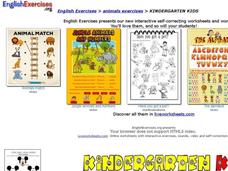Project WET Foundation
Investigate Fresh Water
It's all about freshwater in this water interactive! Users navigate through freshwater habitats such as lakes, rivers, and wetlands, taking note of the animals that live there. They also look at a desert habitat for comparison....
Howard Hughes Medical Institute
Niche Partitioning and DNA Metabarcoding
What is DNA metabarcoding? Show your biology class the latest method for studying biodiversity in an ecosystem with a fun, informative interactive. Individuals examine the animal species that compete for vegetation, then learn how their...
Curated OER
Kindergarten Kids: Animals Exercises
In this online interactive animal habitat worksheet, students respond to 15 multiple choice questions that require them to match animal pictures to the correct habitat pictures. Students may submit their answers to be scored.
American Museum of Natural History
Cuban Wildlife Matching Game
Young biologists match Cuban wildlife to their ecosystems by dragging images of the creatures to either a forest, coral reef, cave, or wetland habitat.
American Museum of Natural History
Ocean Creature Feature
From coloring to hard protective shells, ocean creatures have adaptation features that help them survive. An eight-question online quiz highlights different ocean animals and their unique characteristics. The resource then offers pop-up...
American Museum of Natural History
Welcome to the Dzanga-Sangha
One ecosystem is home to numerous habitats—how diverse are they? Pupils interact with an online lesson to explore three habitats in a rain forest ecosystem. They discover connections between species and how they depend on each other for...
Curated OER
Adapt a Poem to a Wetland Habitat
In this adapt a poem to a wetland habitat worksheet, students read the poem "Over in the Meadow", then write 5 new stanzas using that format about a wetland or a swamp and its animals. This page has several links to helpful websites.
American Museum of Natural History
Life in the City
Believe it or not, biodiversity exists even in areas of disturbed habitat. An interactive activity challenges learners to look for species with a magnifying lens in an image of a city habitat. Pop-up images and descriptions explain how...
Vocabulary University
My vocabulary.com: Animals in Their Habitats
A variety of vocabulary puzzles and activities are provided on the theme of animals in their habitats.
PBS
Wgbh: Peep and the Big Wild World: Games: Animal House Hunt
Cleverly animated matching game asks players to match animals to their homes. [All instructions and prompts are voiced, not written, making this an excellent resource for young children and English language learners who need practice in...
Other
Brooklyn Expedition: Structures
If you've ever wondered how animals use their homes or what we are made of, this is the place to look. This site from the Brooklyn Children's Museum explores the shared characteristics among animal skeletons and homes, architecture, art...
TVOntario
Tvo Kids: Games: Animal Where?
Complete this puzzle game by clicking and dragging animals to place them in their habitat.
Other
Switch Zoo: Where Do I Live?
In these games, you will move the animals who live in Switch Zoo to their original home continent or ocean.
PBS
Pbs Kids: Plum Landing: Plum's Creature Connector
This PBS Kids activity is an extension of a Plum Landing episode featuring food webs. Students will learn basic information about how animals are interdependent. Students will help different animals survive in their different habitats












